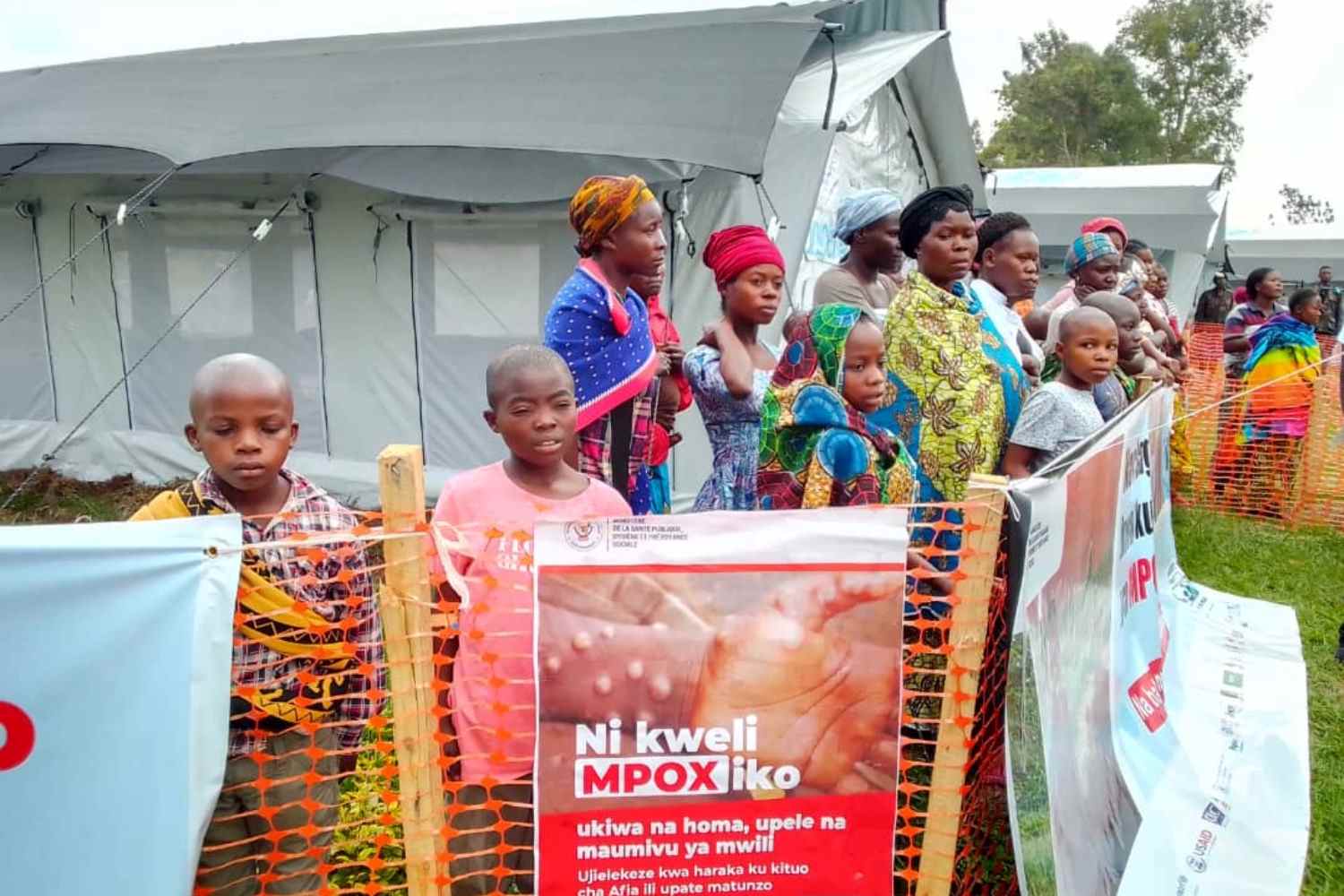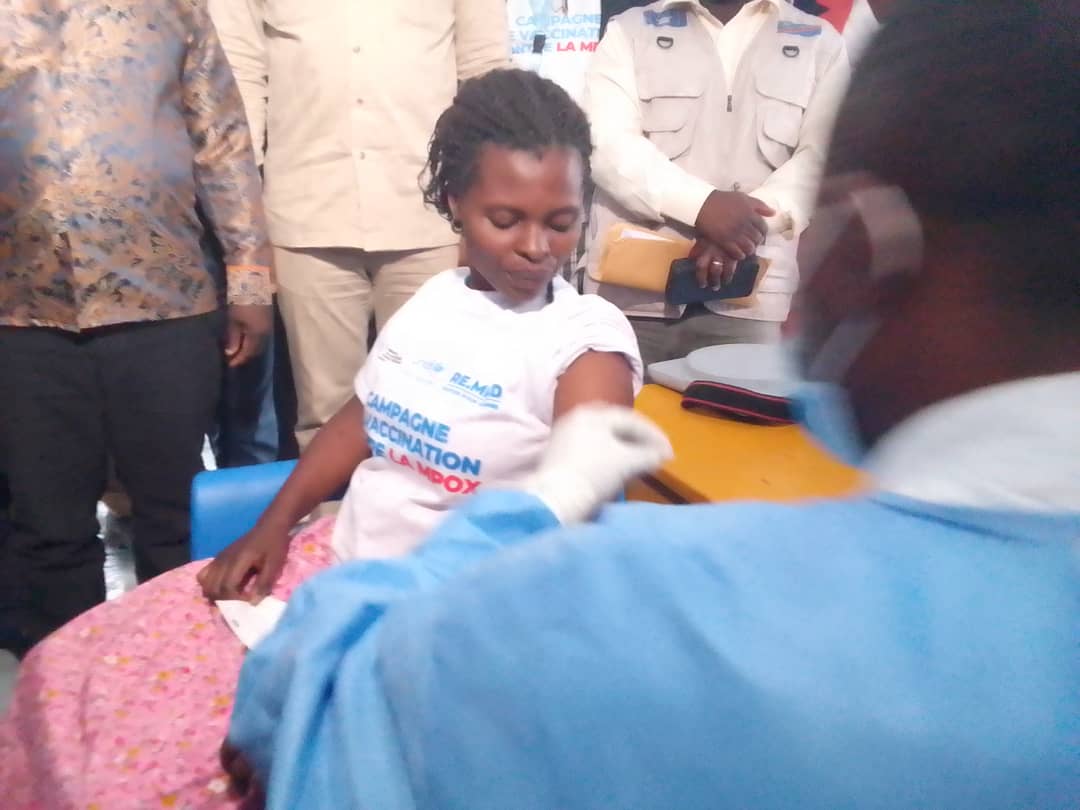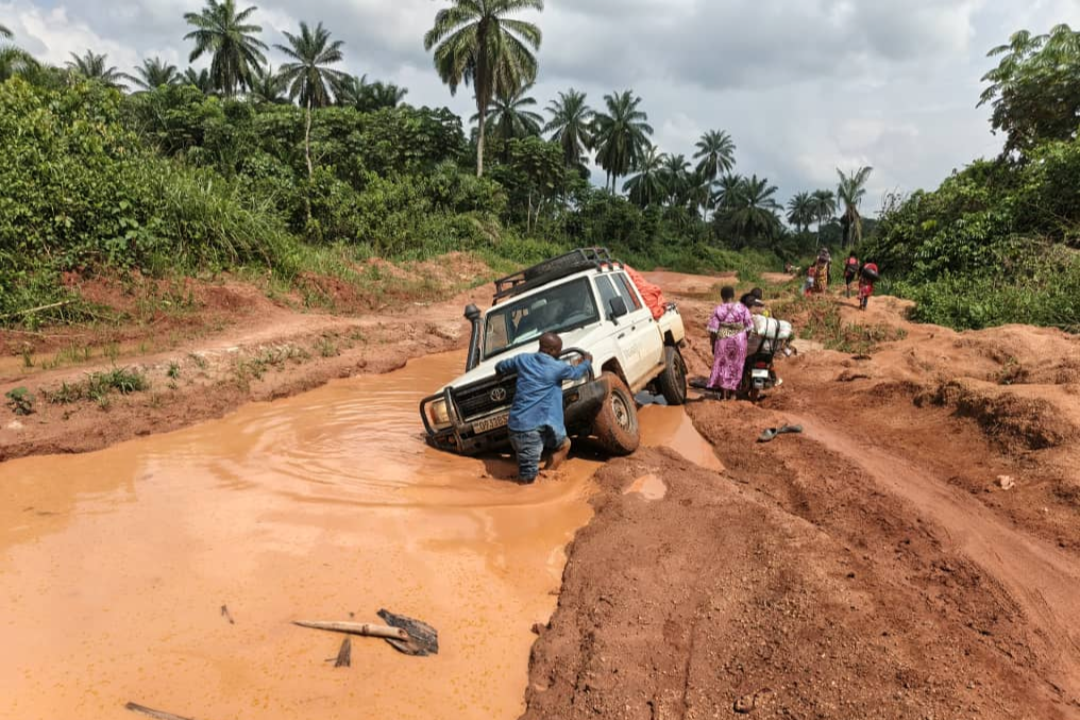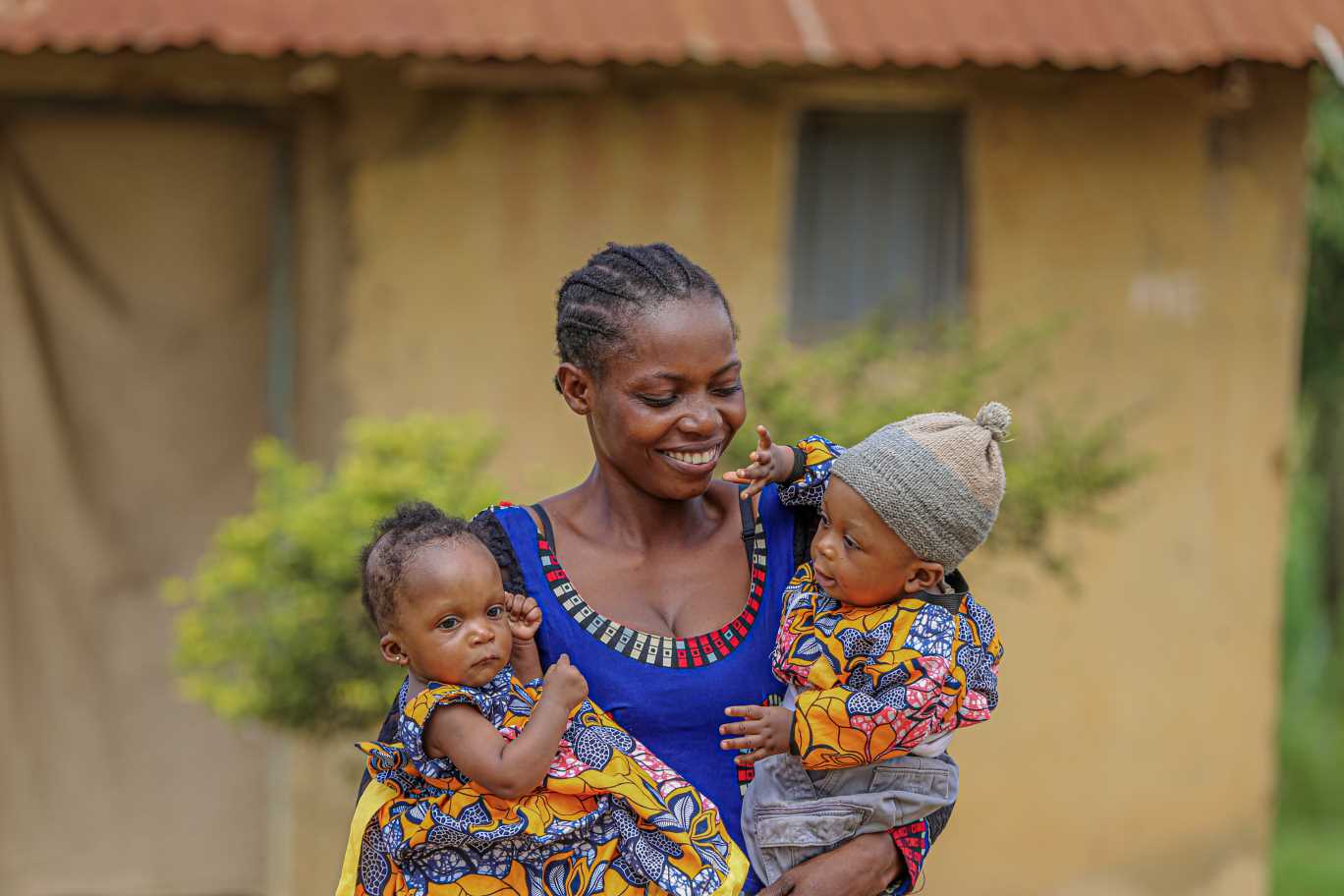Mpox in the DRC: vaccination at the heart of the response
Hundreds of thousands of doses of mpox vaccine are rolling out in the Democratic Republic of the Congo, embraced with relief in viral hotspots.
- 6 November 2024
- 8 min read
- by Patrick Kahondwa

The Democratic Republic of the Congo (DRC) has kicked off its vaccination campaign against mpox, the viral disease that has caused outbreaks on several continents in recent years, prompting both the World Health Organization (WHO) and the Africa Centres for Disease Control and Prevention (Africa CDC) to declare a health emergency this August.
Since the start of 2024, DRC has seen a worrying rise in both cases and deaths related to mpox. According to the Africa CDC, over 4,900 confirmed cases have been reported countrywide, leading to more than 629 deaths. This marks a sharp increase compared to previous years, with local health authorities struggling to rein in the new outbreak.
Mpox, a zoonotic virus, is divided into two main clades, or strains: clade I (which includes subclades Ia and Ib) and clade II (which includes subclades IIa and IIb). The DRC is especially affected by clade Ib, which has a higher mortality rate.
“In our line of work, we meet many people. Some might have mpox and could infect us. We were informed that the vaccine was on the way and that it was crucial for us to get vaccinated because we’re vulnerable. Now that I’m vaccinated, I feel much better.”
- Anonymous, sex worker, Uvira
Ray of hope
In September 2024, about 265,000 doses of mpox vaccine arrived in the DRC. These doses were then distributed across 12 health zones, many of which, including the provinces of North and South Kivu, have been severely impacted by mpox. South Kivu is particularly vulnerable due to its high population density and limited health resources. The city of Uvira, located in the province, has become a central hub for vaccinations.
The launch of this vaccination campaign has been welcomed as a relief by a population already facing multiple health crises, including ongoing transmission of COVID-19 and the lingering threat of an Ebola resurgence.
Vaccination sites quickly became crowded, especially with people at higher risk of exposure to the virus, such as health workers and people working in the sex trade.
A sex worker at Uvira General Hospital, who preferred to remain anonymous, shared her thoughts after getting vaccinated: “In our line of work, we meet many people. Some might have mpox and could infect us. We were informed that the vaccine was on the way and that it was crucial for us to get vaccinated because we’re vulnerable. Now that I’m vaccinated, I feel much better.”
“We’re glad the government is taking steps to protect people, but many still need to be vaccinated in hard-to-reach areas. The vaccine is here, but we must ensure everyone can access it.”
- Alphonse Mufariji, civil society leader
Supply worries
The vaccine being used in this campaign is a live attenuated type derived from the smallpox vaccine, and an effective tool against mpox. However, with mpox cases increasing, getting these life-savers to the communities that need them has been a challenge. The first tranche of doses was delivered to and within the country with support from an international consortium of partners, including the European Union’s HERA, Africa CDC, USAID and Gavi. Gavi has signed an agreement with manufacturer Bavarian Nordic for an additional 500,000 doses to roll out in Africa in 2024.
The vast geography of the DRC has only added to the logistical challenges facing this particular vaccine roll-out. Distributing vaccines in areas where infrastructure, including the cold chain, is weak or damaged can be especially difficult.

Credit : Ricky Ombeni
Alphonse Mufariji, a civil society leader, shares his mixed feelings: “We’re glad the government is taking steps to protect people, but many still need to be vaccinated in hard-to-reach areas. The vaccine is here, but we must ensure everyone can access it.”
Health authorities and partners step up
The Congolese government, with help from international partners like WHO and Africa CDC, has rolled out several strategies to respond to the epidemic. Alongside vaccination, they’ve launched awareness initiatives about preventive measures, particularly in areas where health care is harder to come by. Authorities are urging communities to limit contact with wild animals that could be carriers, and to report any suspected cases quickly.
Dr Nanou Yanga, who leads the mpox vaccination efforts within the country’s Essential Programme on Immunization (EPI), emphasises the work being done to slow the virus’s spread.
“The disease itself has raised awareness among people about the need to protect themselves. Unfortunately, we still don’t have enough vaccines for everyone, so we’re prioritising key groups – those who have direct or indirect contact with infected individuals – to break the transmission chain.”
At the same time, officials are calling for more support from the international community to secure additional vaccine doses and improve local logistics.
“When the epidemic started, we were unsure how we would treat patients without risking our own lives. Now that the vaccine is here, we’re hopeful that we can contain the situation, similar to what we did with COVID-19.”
- Imani Nakagoje, Nurse, Ulvira
Frontliners to the front
Health care workers are at the forefront of the battle against this epidemic and are among the first to receive the vaccine. While many express relief, they also voice concerns about the outbreak’s scale. “Recently, we lost a nursing colleague to mpox. His death was a shock for all of us,” says Rachid Ndakundi, president of the Nurses’ Association in Uvira. “With the vaccine, we feel better protected, but it’s crucial that all health care workers are vaccinated quickly to prevent further losses.”
Imani Nakagoje, a nurse at an mpox treatment centre in Uvira, adds, “When the epidemic started, we were unsure how we would treat patients without risking our own lives. Now that the vaccine is here, we’re hopeful that we can contain the situation, similar to what we did with COVID-19.”
“We’ve faced many challenges, from polio to Ebola to COVID-19. With vaccination efforts in place, we believe we can overcome this mpox epidemic.”
- Uvira resident
Interdisciplinary strategies to reach at-risk populations
In Uvira and other affected areas, teams from the EPI are working hard to reach at-risk populations, even with limited doses. “We have eight teams at the vaccination site responsible for covering the entire health zone by identifying people who need the vaccine. In addition to welcoming those who come to the health centre, our teams also go to where larger groups are,” explains Dr Nimi Panzu, Chief Medical Officer for Uvira.
To enhance their efforts, they’ve implemented interdisciplinary strategies to ensure they reach everyone in the target population. Dr. Nanou elaborates, “As part of this campaign, we’re utilising the structures of the National AIDS Control Program and the National Multisectoral AIDS Control Program to improve our outreach. We’re also collaborating with the animal health programme to connect with other vulnerable groups, like livestock farmers, fishermen, hunters and eco-guards.”
Have you read?
A long-term fight against mpox
Mpox is now classified as a public health emergency of international concern by the WHO and recognised as a priority threat by Africa CDC and Gavi. This means the battle against this disease is about more than just immediate responses. With the backing of international partners, DRC hopes to secure additional vaccine doses and enhance its epidemiological surveillance capabilities to manage the epidemic over the long haul.
In the meantime, the affected communities remain hopeful. “We’ve faced many challenges, from polio to Ebola to COVID-19. With vaccination efforts in place, we believe we can overcome this mpox epidemic,” says a resident of Uvira.
Joining forces for effective and sustainable continental coordination: Gavi’s role
As the mpox epidemic spreads across Central and West Africa, Gavi, the Vaccine Alliance, is stepping up to support the continental response.
The organisation has deployed staff on the ground for both global coordination and direct support in the DRC, working to unify the efforts of various stakeholders in addressing the crisis. Dr Marthe Sylvie Essengue Elouma, Gavi's Regional Head of West and Central Africa, explains that this initiative not only aims to tackle the current outbreak but also to strengthen resilient health systems for future challenges.
“This is the first time Gavi has sent staff for a direct response. It allows us to collaborate more effectively with other partners and create a rapid, tailored response that meets the evolving needs of the local population,” she says.
One key aspect of building resilience is enhancing epidemiological surveillance and involving community members in monitoring, case detection and reporting. In DRC, Gavi is helping to improve the health information system by equipping local levels with digital tools for faster data collection, reporting and contact tracing. “Collecting quality data is essential for an effective response, interrupting transmission and preventing future crises,” emphasises Cyril Nogier, Gavi Senior Country Manager for the DRC.
Community engagement is also central to this integrated strategy. Gavi is supporting local health workers, who play a vital role in both epidemic response and routine vaccination efforts to reach zero-dose children. “Strengthening community engagement during both normal times and epidemics builds the resilience of health systems,” he adds.
Moreover, while promoting vaccination to curb the outbreak, Gavi is also focused on ensuring the continuity of routine vaccination services during the mpox response. In recent years, Gavi and its partners, including the World Bank, have worked to enhance the cold chain infrastructure to support both ongoing vaccination campaigns and regular health activities. “It’s crucial that other essential health services are not compromised,” says Cyril Nogier.
By coordinating with regional health partners like WHO, Africa CDC, UNICEF, the Global Fund, the African Development Bank, the World Food Programme, the International Organization for Migration, Médecins Sans Frontières, and others, Gavi aims to use the lessons learned from the mpox epidemic to strengthen health systems in affected countries, ensuring they are better equipped for future health emergencies.
Follow the writer on X/Twitter : @PatrickKahondwa
Translated from the original French version
More from Patrick Kahondwa
Recommended for you







